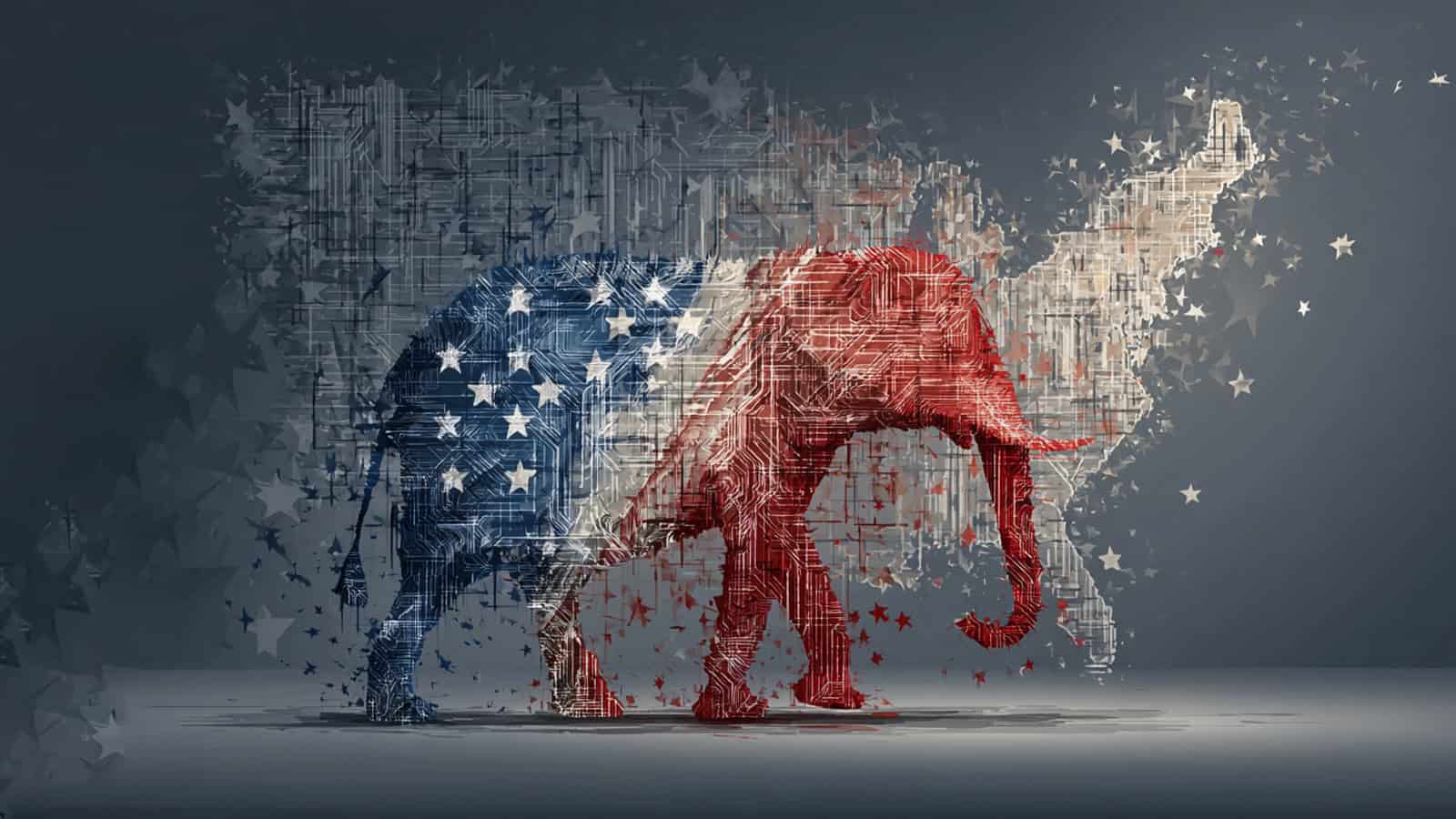
Become a member to access the full episode
Start building your big picture mind & support the global emergence of Integral consciousness

“Integral Life is the most important and globally-relevant platform for the leading edge of Integral consciousness evolution”
– Eugene P.
Perspective Shift:
- Beneath the noise of politics is a deeper identity crisis. When the economic and foreign policy legs of the Old Right collapsed, cultural grievance rushed in to fill the void. Today’s political theater is often a performance of psychological dislocation, not a platform for governance.
- The structure of consciousness matters more than the content of beliefs. Just because someone uses pluralistic language doesn’t mean they’re Green. Just because someone values tradition doesn’t mean they’re Amber. Without a developmental lens, we confuse people’s beliefs with the altitude of consciousness behind them.
- The enemy isn’t the Left or the Right — it’s the Red shadow in both. Polarization isn’t a war between values, it’s a breakdown of integration. The real danger isn’t progressives or conservatives, but the unprocessed Red energy that hijacks these cultural blocks and animates each side’s tribalism, scapegoating, and will to dominate.
- Not all traditionalism is regressive, and not all progressivism moves us forward. Tradition can anchor and stabilize growth, while progressivism can become chaotic when untethered from structure. What matters isn’t whether an idea is old or new, but whether it fosters greater wholeness, depth, and integration.
- Authoritarianism doesn’t arise from tradition; it emerges when tradition is destabilized. Healthy Amber structures channel and contain the raw energies of Red. But when Amber collapses, what comes next isn’t progress — it’s chaos dressed in conviction. Rebuilding tradition is not regressive; it’s a prerequisite for healthy evolution.
- Integration doesn’t mean compromise — it means discernment. Integral politics isn’t about splitting the difference or standing in the middle. It’s about recognizing the partial truths in each worldview, then situating and prioritizing those truths based on the needs of the moment and the developmental capacity of the culture. The goal isn’t agreement, it’s evolution, intelligently guided by context.
In this provocative and deeply insightful presentation, philosopher David Storey invites us to explore the shifting terrain of the American Right through an integral lens. What happens when a political movement loses its center of gravity? How do we make sense of the post-Trump “New Right,” with its seemingly chaotic blend of populism, conspiracism, religious revivalism, and technocratic libertarianism? And perhaps most importantly: How might Integral Theory help us distinguish between regressive traditionalism and the wisdom of true conservative thought?
Storey begins by diagnosing the collapse of the “Old Right” — the Reagan-era fusion of free-market liberalism, muscular foreign policy, and social conservatism. After the financial crisis, the Iraq war, and the rise of populist sentiment, two of the Right’s three foundational pillars have largely crumbled, leaving behind a party increasingly defined by cultural grievance and tribal identity. What’s emerged in their place is not a coherent ideology, but a fractured landscape of psychological memes and political subcultures that defy conventional categories.
Through the framework of Spiral Dynamics, Storey maps this terrain with striking clarity. From the magical-realist conspiracies of QAnon to the hypermasculine, anti-modern stylings of Bronze Age Pervert; from the libertarian swagger of Barstool conservatives to the separatist dreams of Christian intentional communities; and from the disaffected technocrats of Silicon Valley to the old-guard Never Trumpers — each faction expresses different value structures, often regressing into Red or Amber (or Red and Blue, in Spiral Dynamics language) while borrowing Green or Orange language. Beneath their differences, they share a common foe: the so-called “woke mind virus,” though Storey suggests they often target caricatures rather than engaging with healthy expressions of progressive values.
Storey’s most original contribution may be his deep dive into the rise of Catholic Integralism and the broader “post-liberal” movement. Figures like Adrian Vermeule and Patrick Deneen argue that liberal modernity itself — based on autonomy, individual rights, and secular progress — is a failed social experiment calling for wholesale replacement with a virtue-based, theologically grounded order. But as Storey warns, much of what’s labeled “post-liberal” is actually pre-liberal, echoing authoritarian worldviews that preceded the modern experiment in pluralism and democracy.
What, then, would a truly Integral Conservatism look like? Here, Storey opens fascinating philosophical territory. If integral thinking truly transcends traditional political categories, what does it mean to be genuinely conservative from an integral perspective? His provocative answer: recognizing that tradition, modernity, and postmodernity are all traditions in their own right — each containing wisdom worth preserving and pathologies demanding confrontation.
Rather than rejecting liberal modernity, Storey argues for re-growing healthy Amber — revitalizing the social cohesion and moral clarity that allow democracy to function — while integrating Orange’s pragmatism and Green’s compassion. His most intriguing proposal involves marrying progressive economics with spiritual and moral sensibility, noting that many traditional Christians are alienated less by policy than by the secular packaging of progressive values. But this raises profound questions: Can such a synthesis overcome the historical tensions that have kept these traditions apart? What would it actually look like in practice?
Through his analysis of figures like Pete Buttigieg — who combines traditional religious values, military service, technocratic competence, and progressive identity — Storey invites us to imagine what integral political leadership might actually embody. This opens further inquiry: Can any individual truly integrate these complex value systems in the political arena? What structural changes would support such leadership?
Ultimately, Storey suggests that the real fault line in American politics may not be Left vs. Right, but development vs. regression — whether our responses to cultural breakdown spiral downward into fear and authoritarianism or upward toward synthesis and renewal.
This presentation is both a sobering diagnosis of our current political moment and a hopeful gesture toward transcending polarization — not by splitting differences, but by integrating the partial truths of our major traditions into a fuller, more coherent whole. While Storey’s analysis raises more questions than it definitively answers, this may be precisely the point. In a political moment defined by false certainties and tribal simplifications, his work models the kind of nuanced, developmental thinking our crises demand.
The conversation he’s started about integral conservatism is far from over — it’s an essential exploration for anyone seeking to understand how conscious development might reshape our political future.
—Recorded at the 2024 ICON Conference in Denver, Colorado
 Key Questions
Key Questions
Here are some questions you can contemplate while listening to this discussion. We suggest you take some time to use these as journaling prompts.
- What is my relationship to my own political beliefs — am I holding them or are they holding me? Notice where your political views feel like fixed identity rather than evolving understanding. How might your attachment to being “right” politically prevent you from seeing partial truths in opposing perspectives?
- Where am I confusing my developmental stage with moral superiority? Examine honestly: do you use frameworks like stage development to feel more evolved than others, or to genuinely understand different value systems? How does developmental arrogance show up in your political thinking?
- Where do I mistake novelty for progress and stability for stagnation?> Notice your bias toward either change or continuity. How might you be missing the developmental necessity of both preservation and transformation?
- What do I most despise in the opposing political tribe — and how might that reflect my own disowned aspects? The qualities you find most repugnant in “the other side” often mirror rejected parts of yourself. What would it mean to find those tendencies within your own psyche?
- Where am I using spiritual or integral language to mask tribal thinking? How do concepts like “consciousness” or “development” sometimes become sophisticated ways to dismiss viewpoints that threaten your worldview?
- What would it mean to be politically engaged without being politically possessed? How might you participate in civic life while maintaining perspective on the partial nature of all political positions? Where does your political engagement serve consciousness versus ego?
- What unique role might I play in bridging political divides in my sphere of influence? Where are you positioned to model integral political engagement — in your family, workplace, community? How could your own development serve collective healing?
- What am I not seeing about the “other side’s” legitimate concerns regarding cultural change? If you’re progressive, can you genuinely understand conservative worries about rapid social transformation without dismissing them as bigotry? If you’re conservative, can you recognize authentic experiences of marginalization and systemic harm without reducing them to “victimhood culture”? Where might both sides be responding to real phenomena while missing each other’s deeper truths?
About David Storey
David E. Storey is Associate Professor of the Practice in the Philosophy Department at Boston College, where he teaches courses on the history of philosophy, ethics, theology, technology, and climate change. He received his PhD in philosophy in 2011 from Fordham University, is a certified Philosophical Counselor with the American Philosophical Practitioners Association, and is a certified Koru Mindfulness instructor.


